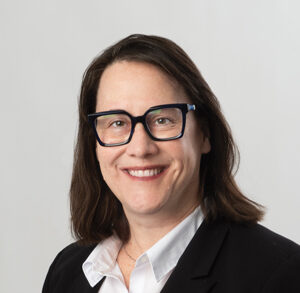Education leaders discuss Iowa’s career readiness gaps


Local education stakeholders discussed how to better connect students with career opportunities in Iowa at the West Des Moines Chamber of Commerce’s recent August luncheon.
Meredith Murphy, the chamber’s director of future workforce, led the discussion, which included the following panelists:
- Kristin Brookover, associate vice president of student affairs at Des Moines Area Community College
- Rachelle Keck, president at Grand View University
- Brad Buck, superintendent at Waukee Community School District
- Georgia Van Gundy, deputy director at Iowa Workforce Development
The panelists agreed that there are many positives in the state when it comes to education, job training and professional opportunities. There are also many challenges.
Economic development
As Keck put it, one of the biggest challenges is retaining young workers or attracting new ones to the state.
“Iowa produces the third-highest earning talent nationally in terms of income, yet we lose 3,500 college graduates per year from the state. It amounts to $6.1 billion in lost GDP and $17.6 million in lifetime income lost per graduate,” she said. “To me, the biggest opportunity is not only recruiting new talent to the state but we absolutely have to hold on and retain the talent that already exists in the state.”
As the enrollment cliff nears, the effect of the loss of students to other states could become more prominent. The financial crisis of 2008 led to parents having fewer children, and communities are starting to experience smaller classrooms and worker pools because of it.
“By next year, there will be a 15% to 20% reduction in the number of 18-year-olds because of the 2008 financial crash,” Keck said. “Don’t think for a minute that all the states around us aren’t going to steal our high school graduates.”
To improve retention, Iowa must improve its reputation, she said.
“I think one of the opportunities is showing our young people that we not only have career pathways for you, but it is in a whole lifestyle of economic development, quality of life. We have good health care, we have good schools. It’s a great place, not only to start, but end your life,” Keck said. “We have opportunities here and we can provide those to you and it will be a fantastic life.”
Workforce readiness
There is a need for more workforce readiness skills training and work-based learning opportunities, Buck said. More students need to learn at a younger age what businesses are here in Iowa, what those businesses do and what kind of jobs are available, Van Gundy said.
Keck said the top feedback she hears from employers is students are not ready for the workforce. The Jacobson Institute at Grand View University is creating a new certificate program in professional readiness.
“We hear this feedback a lot from our business and industry partners, that while students or graduates who come into the workforce may have the technical skills or the knowledge that they need, but they may have a professional readiness gap,” she said. “My answer to this would be to create a mandatory professional readiness curriculum throughout, whether it’s starting in middle school or early high school, because they’re not just soft skills. They really are truly those skills that students need to succeed once they graduate beyond the technical and work skills.”
Buck said as a school administrator he needs clarity about what is needed by employers, in a more quantifiable way. When talking with business leaders, he hears that students need more training in grit, tenacity, understanding ambiguity and tolerating change.
“If we could just get clarity around, here’s the career clusters [that need to be filled in Central Iowa], here’s what the pathways [to those careers] look like to get to the career clusters, here’s what the education is that you’re going to need to do those and along the way, we’re going to make sure that you’re a good student, good neighbor and good worker,” he said.
Each of the panelists noted that there needs to be more participation by employers in these early stages of career development, when students are still in K-12 schools.
“If we want to have work-based learning, you have to have businesses at the table who have the ability to provide opportunities for students,” Van Gundy said. “If you want to create programs for students that require so many hours of their time, you have to understand what’s taking up their time and know if that’s going to work for them. I talk a lot about that with my team, but I would love to see agencies collaborate better, and us collaborate better with school districts.”
What’s working
There are some programs that bring together students with area employers, such as the Central Campus programming, Aspiring Professional Experience programming at the Waukee Community School District and workforce training programs through Iowa community colleges to name a few, panelists said.
“Those opportunities where you’re actually bringing together business and students early, so that they understand what those careers are out there for them, and that employers start working with them at an earlier age is really critical,” Van Gundy said.
School districts that do not offer that kind of programming and infrastructure can work on building relationships with employers to improve connections with students.
An example is Waukee’s APEX program at the Waukee Innovation and Learning Center, where 800 businesses and other partnering organizations connect with students, Buck said.
“Businesses or nonprofits come up with projects that may be currently just outside of their reach, and they come and pitch ideas to kids, and the projects are aligned to the content that’s in the classroom, so kids get authentic experiences with real business partners doing work out in our community,” he said.
Buck said that the APEX program started with the work of one school-to-work teacher who went into the community and created relationships with business owners and leaders.
“It doesn’t have to be the APEX program in the WILC facility,” he said. “It can be as important and simple as one teacher, maybe half of their day is committed to trying to create the linkages and then going from there.”
Grand View has a master’s degree in data analytics with a corresponding “earn-as-you-learn” program that matches students with local employers. Keck mentioned that Toyota has a technician training program that she would like to see get started in the area.
“I would love to see more of this here in the metro, but it blends that classroom instruction with paid hands-on training inside the Toyota Corporation at all levels, so that students can see and feel and do the work while they’re in,” she said. “It’s part-time courses in the classroom or at the college, and also learning. It’s a great way, not only for students to get that hands-on experience, but also for employers to kind of date before you marry and figure out if this is going to be a good fit. Because it’s about so much more than just skills and knowledge. It’s also about that compatibility and chemistry and fit with an organization.”
Brookover said DMACC is partnering with Microsoft and the city of West Des Moines for students to earn a data center technician certificate at DMACC’s West campus.
“There’s a recognition for an industry need. There is a recognition for employment, for a population [West Des Moines] has identified,” Brookover said. They’re helping with transportation and mentorship from the human services office. Microsoft is covering the expense, and then we’re offering all of the training on-site. This is the first year we’re doing it. It’s through this fall term, and I hope that it will continue to be an example of how we can partner to meet and even continue to build that out.”
Next steps
Going forward, panelists said Iowa needs more collaboration and engagement between schools and employers, as well as a talent pipeline of some kind to route workers to the right jobs.
Buck said employers can reach out to Tim Murphy, a Waukee school district school-to-work coordinator, or Lexi Shafer, the Waukee school district’s business relationships manager to find ways to partner and find future workers.

Gigi Wood
Gigi Wood is a senior staff writer at Business Record. She covers economic development, government policy and law, agriculture, energy, and manufacturing.










